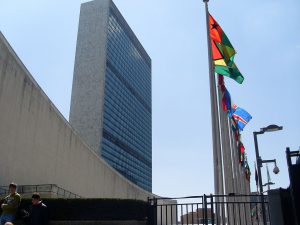 World Without Genocide, an organization based at Mitchell Hamline School of Law, was one of nine human rights organizations to be awarded Special Consultative Status by the United Nations’ Economic and Social Council in early December. The council is one of six main organs of the U.N. and oversees economic development and social issues.
World Without Genocide, an organization based at Mitchell Hamline School of Law, was one of nine human rights organizations to be awarded Special Consultative Status by the United Nations’ Economic and Social Council in early December. The council is one of six main organs of the U.N. and oversees economic development and social issues.
Special Consultative Status gives the organizations access to the council and to its many subsidiary bodies, to the human rights mechanisms of the United Nations, to ad hoc processes on small arms, and to attendance at special events organized by the President of the General Assembly. Organizations with consultative status also can typically be accredited to attend relevant U.N. global conferences and even host events at the U.N. headquarters in New York.
Other organizations with this status include Amnesty International; the International League for Human Rights; the International Bar Association; and the Special Olympics.
The vote on Dec. 7 to add World Without Genocide came after years of delay, according to the Associated Press. The AP noted the organizations now have “the right to raise concerns and participate in its discussions.” The 24-17 vote with 12 abstentions prevailed over objections from countries including Russia, China, and India. Louis Charbonneau, U.N. director at Human Rights Watch, told the AP that adding the groups “sends a strong signal to the world that the U.N.’s doors — remain open to civil society organizations, despite efforts by China, Russia, India and others to keep them out.”
The other eight organizations that gained the status include the Arab-European Center of Human Rights and International Law and the Union of Non-Governmental Associations. The U.N. has granted Consultative Status since its beginning in 1946; today, several thousand non-governmental organizations around the world represent civil society at the U.N.
World Without Genocide promotes education and action to protect innocent people, prevent genocide, prosecute perpetrators, and remember those affected by genocide. The organization was designated as formally associated with the United Nations Department of Global Communications about a year ago.
